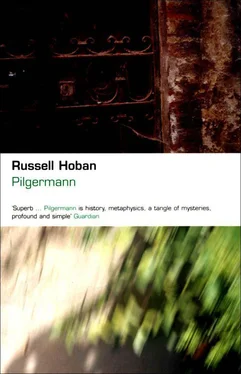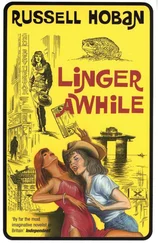Russell Hoban - Pilgermann
Здесь есть возможность читать онлайн «Russell Hoban - Pilgermann» весь текст электронной книги совершенно бесплатно (целиком полную версию без сокращений). В некоторых случаях можно слушать аудио, скачать через торрент в формате fb2 и присутствует краткое содержание. Год выпуска: 2002, Издательство: Bloomsbury Publishing PLC, Жанр: Современная проза, на английском языке. Описание произведения, (предисловие) а так же отзывы посетителей доступны на портале библиотеки ЛибКат.
- Название:Pilgermann
- Автор:
- Издательство:Bloomsbury Publishing PLC
- Жанр:
- Год:2002
- ISBN:нет данных
- Рейтинг книги:5 / 5. Голосов: 1
-
Избранное:Добавить в избранное
- Отзывы:
-
Ваша оценка:
- 100
- 1
- 2
- 3
- 4
- 5
Pilgermann: краткое содержание, описание и аннотация
Предлагаем к чтению аннотацию, описание, краткое содержание или предисловие (зависит от того, что написал сам автор книги «Pilgermann»). Если вы не нашли необходимую информацию о книге — напишите в комментариях, мы постараемся отыскать её.
Pilgermann — читать онлайн бесплатно полную книгу (весь текст) целиком
Ниже представлен текст книги, разбитый по страницам. Система сохранения места последней прочитанной страницы, позволяет с удобством читать онлайн бесплатно книгу «Pilgermann», без необходимости каждый раз заново искать на чём Вы остановились. Поставьте закладку, и сможете в любой момент перейти на страницу, на которой закончили чтение.
Интервал:
Закладка:
‘Nineveh,’ I said, pleased with my own joke; I had noticed the name but could not read the Arabic characters. But later I asked a Greek-speaking pirate what the name was.
‘Nineveh,’ he said.
To be sold for a slave is a startling experience. The rest of the world knows so little about one and yet it is they who set the price. We were all stripped and examined and relieved of our luggage and whatever was in our pockets or sewn into our clothes. The pirate captain was delighted to find that I was a eunuch in good condition; he made that gesture of kissing the fingers made by all vendors who reckon that they have something especially fine to sell. In the slave market in Tripoli, standing in the cool and coloured shade of awnings, smelling the smoke of water pipes and a variety of Middle Eastern cooking that invited one to abandon introspection and embrace such pleasures of the senses as now offered, hearing Arabic, Syriac, Armenian, Turkish, and Greek spoken all round me I was not so distressed as one might think; it had never before happened to me that I was valued, and highly valued, for my visible qualities alone. It occurred to me that I might be bought for harem duty and I felt a little stir of pleasure; orchards are pleasant even if one can’t climb the trees.
A succession of prospective buyers stood before me and tilted their heads to one side, trying, I suppose, to imagine me in their houses as one imagines a table or a chair or a wall hanging. Would I go with the rest of it. A variety of people-buying faces looked at me from under turbans, fezzes, and kaffiyas. The pirate captain found many things to say about me, none of which I understood because he spoke in Arabic. He was at pains to show interested viewers that I had good teeth and he seemed particularly pleased by the arch of my foot, drawing attention to it frequently. In my mind I saw myself standing hour after hour outside the closed doors of a harem listening to laughter and low murmurings while little by little my feet grew flat.
There was standing before me a tall and noble-looking Turk with heroic moustaches, a red fez, a scarlet and purple jacket worked with gold. I judged him to be sixty or so. He put a large hand on my shoulder and drew me a few steps away from the others. He looked at me in such a way that I knew he was going to say something that would make me his friend. He said to me in Greek, ‘What if I say to you that the universe is a three-legged horse, eh? What then? What will you say to me?’
I said to him, ‘It is because the universe is a three-legged horse that the journey to the red heifer is so slow.’
‘Ah!’ he said, ‘You’re a Jew then.’
‘How does that follow?’ I said.
‘A Jew will consider anything,’ he said. ‘Are you or aren’t you?’
‘I am,’ I said.
‘I need you,’ he said. ‘Do you need me?’
‘Yes,’ I said.
‘Done!’ he said. My price was twenty-five dinars but he counted out fifty gold dinars and gave them to the pirate captain.
‘This is twice as much as I have asked,’ said the pirate captain in Greek to the Turk. This pirate’s name, by the way, was Prodigality. He had formerly been a slave named Thrift who had in trading for his merchant master put by enough money to buy his freedom, and having done so he changed his name and went into piracy. ‘Why are you doing this?’ he said to the Turk.
‘I am afraid not to,’ said my new owner. ‘I want Allah to take notice that I am taking notice of my good fortune.’
‘If Allah’s taking notice I don’t want to look bad,’ said Prodigality, and counting out twenty-five dinars he put them into my hand.
Both men looked at me with expectation.
‘Can I buy myself back?’ I said to my new owner.
‘Just as you like,’ he said. Prodigality wrote out a bill of sale to him and he wrote out a bill of sale to me. I then gave him the gold that Prodigality had given me.
‘Now you’re a free man,’ said my former owner. ‘What will you do?’
‘I’ll come with you freely,’ I said, ‘as we need each other.’
‘Thus does the will of Allah manifest itself in human transactions,’ said my new friend.
‘Wait!’ said Prodigality as we turned to go, and taking my hand he put into it the remaining twenty-five dinars of the double payment.
‘What’s this?’ I said.
‘Allah wills what Allah wills,’ said Prodigality. ‘Let it be altogether circular.’
‘I am obedient to the will of Allah,’ I said, and put the gold back into the hand from which it had originally come.
‘Let it be noticed by all who have eyes to see,’ said my new friend as he received the gold, ‘that Allah has taken notice.’
‘It’s a pleasure doing business with you,’ said Prodigality. ‘It’s spiritually refreshing. It’s only a pity I can’t afford this sort of thing more often.’
With many expressions of mutual esteem we parted, and as I walked away with my former owner and new friend I marvelled at how Prodigality had been able to rise above the practical considerations of commerce. Certainly with my gold and diamonds and the plunder from the other pilgrims in his coffers he could afford to be generous but even so it seemed remarkable to me that gold and silver and gems could produce in him that degree of moral sensitivity that enabled him to behave so handsomely.
My new friend’s name was Bembel Rudzuk; he was a wealthy merchant who lived in Antioch. I went with him to the khan where he and his party were staying, and the next morning we departed for Suwaydiyya on one of his dhows. ‘How strange that was yesterday!’ I said to him. ‘How extraordinary!’
‘Now more than other things,’ said Bembel Rudzuk. ‘To me everything is extraordinary and nothing is. Aeschylus was killed when he was hit on the head by a tortoise dropped by an eagle but that’s not extraordinary when you consider that he was sitting directly below the eagle when it dropped the tortoise from a considerable height. On the other hand, that there was Aeschylus, that to me is extraordinary: that the world appeared in his eyes, that the world lived in him like the light in a lantern, that there are continually new lanterns for the world to live in, that you and I are two of them, yes, that to me is extraordinary.’
‘That the universe should be a three-legged horse,’ I said, ‘is that extraordinary, do you think?’
‘I don’t know what to think about that,’ said Bembel Rudzuk. ‘Although I said those words and know them to be true I have no idea what they signify. They came into my head when I first saw you yesterday. Perhaps they signify that for us our meeting is the fourth leg. What colour is the horse for you?’
‘Red,’ I said, ‘like the heifer.’
‘For me also it is red,’ he said.
‘Why do you need a Jew?’ I said.
‘Do you know that story of Abraham that is not to be found in the Holy Scriptures?’ he said. ‘How Nimrod put him into the fiery furnace and God took him out?’
‘Yes,’ I said, ‘I know that story.’
‘Do you perceive,’ he said, ‘that there is alchemy in this story?’
‘Ah!’ I said. ‘He was put into the furnace, he was taken out again.’
‘He will go in again,’ said Bembel Rudzuk.
‘I believe you,’ I said. ‘And when will his base metal be transmuted to gold, how long will that take?’
‘Ah!’ he said. ‘It’s the metal of those who put him into the fire that must be transmuted.’
‘Are there years enough for that?’ I said.
‘Whether there are or there aren’t,’ he said, ‘that’s nothing I can do anything about. But I’m curious about Abraham. Have you heard of the sulphur-mercury process?’
‘I think I’ve seen diagrams of two triangles point to point,’ I said.
Читать дальшеИнтервал:
Закладка:
Похожие книги на «Pilgermann»
Представляем Вашему вниманию похожие книги на «Pilgermann» списком для выбора. Мы отобрали схожую по названию и смыслу литературу в надежде предоставить читателям больше вариантов отыскать новые, интересные, ещё непрочитанные произведения.
Обсуждение, отзывы о книге «Pilgermann» и просто собственные мнения читателей. Оставьте ваши комментарии, напишите, что Вы думаете о произведении, его смысле или главных героях. Укажите что конкретно понравилось, а что нет, и почему Вы так считаете.












